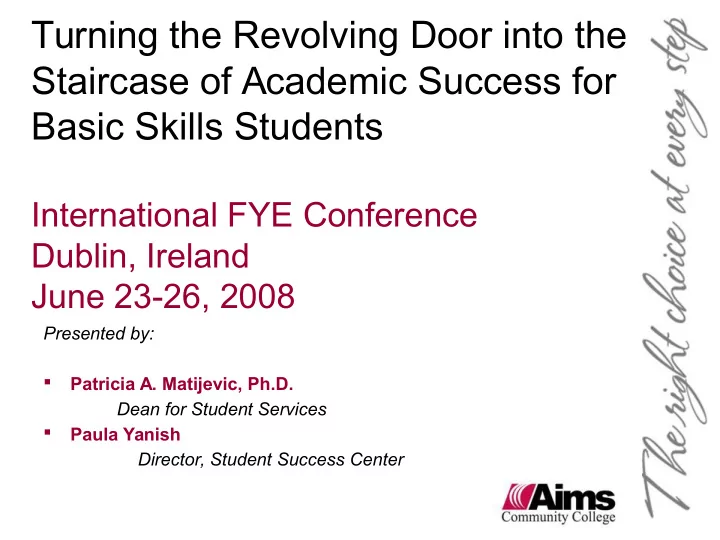

Turning the Revolving Door into the Staircase of Academic Success for Basic Skills Students International FYE Conference Dublin, Ireland June 23-26, 2008 Presented by: Patricia A. Matijevic, Ph.D. Dean for Student Services Paula Yanish Director, Student Success Center
Program Overview About Aims Community College District National (USA), Colorado & Institutional Retention Data Institutional Strategies Emerging Scholars Outcomes & Next Steps
About Aims Campuses: • Greeley, CO • Berthoud, CO (future campus) • Downtown Greeley • Fort Lupton, CO • Loveland, CO • Windsor , CO (future site for Auto Tech) • Online Founded: • 1967 • Over 130 degree & certifjcate programs
Canada United States Mexico
State of Colorado
Weld County 3,992 Square Miles Elevation: 4,658 ft . Climate: Snowfall: 33.7” Days Sunshine: 340
Aims Community College District Weld People QuickFacts County Population (2006) 236,857 Population (2011 projected) 268,025 (2nd fastest growing county in the nation by U.S. Census statistics) Median Age 31.21 Race/Ethnicity White 72% Hispanic or Latino 27% All Others 1% Language English Only speaking 79.70% Spanish speaking 18.20%
Aims Community College District Weld Employment and Wages - QuickFacts County $35,984 Average Annual Wage - All industries, 2007 (USD) Employment - Private sectors Manufacturing 10,047 Retail Trade 8,486 Health Care and Social Assistance 7,407 Accommodation and Food Services 6,322 Administrative and Waste Services 4,933 Agriculture, Forestry, Fishing and Hunting 3,955 Single Largest Employer - JBS Swift & Company Headquarters 3,650 (processed beef, pork and lamb) Unemployment 4.63%
Aims Community College District Weld Education QuickFacts County K-12 Enrollment, 2007 42,031 High School Graduate or Higher 79.6% Some College Associate Degree or Higher 52.8% Bachelor's Degree or Higher 21.6%
Aims College Enrollment
Retention – National Data First to Second Year Retention Rates (ACT Institutional Data File 2007) Institution Type N Mean % Two-year public 405 51.4% Two-year private 40 57.4% BA/BS public 55 67.6% BA/BS private 277 70.2%
Lack of “College-Readiness” (National Center for Educational Statistics, US Department of Education, 2000) Percentage of U.S. College Students Needing Remediation in 2000
Colorado High School Graduates Requiring Remediation at Two-Year Public Schools Colorado Commission on Higher Education 2007 Legislative Report—1/18/08
Aims Data
Comparison of Remedial Needs of New Students at Aims
Institutional Strategies for Improving Student Retention • Fall 2005 -TRIO Student Support Services Program – Funded by US Department of Education High-risk students (1 st generation, low income, with a disability) 85% of cohort requires remediation Services include intensive academic advising, extended orientation, early alert, additional tutoring, mentoring, monetary incentive 73% retention of first year cohort (83% retention from fall 06 to spring 07)
Institutional Strategies for Improving Student Retention • Fall 2006 – STAR pilot (STudent Achievement and Retention) – Title III grant funded (US Department of Education) High-risk students (1 st generation, low income, undecided/undeclared) 74% of cohort required remediation Services include intensive academic advising, extended orientation, early alert 60% retention of first term cohort
Theoretical Framework • Nevitt Sanford – Challenge & Support • Vincent Tinto – Academic/Social Integration – Goal/Institutional Commitment • Nancy Schlossberg – Mattering vs. Marginality
Staff Working with Emerging Scholars Program • Retention Coordinator • Retention Advisor—full-time • 3 part-time Retention Advisors • Advisors at outlying campuses • First-Year Experience Course Coordinator • Financial Aid Director
Emerging Scholars Admission Criteria New to Aims Community College • Unless concurrently enrolled in high school Degree or Certificate Seeking Have 2 or more academic deficiencies (English, Math, Reading) Cohort Goal – 300 students
Emerging Scholars Program Requirements Participate in an Emerging Scholars orientation prior to the start of classes Meet 3 times each semester with the assigned advisor Allow the institution to place a registration hold on his/her account requiring an approval for any changes Attend a minimum of 2 student success workshops during each semester Enroll in and complete college prep courses with a “C” or better and limit enrollment on other academic courses Enroll in and complete a college success (FYE) course Receive a financial incentive (Emerging Scholars Grant)
College Success Class (AAA 101) • Topics include: Welcome, class overview, college jargon Time management Reading your textbook Note-taking from a textbook Campus resources on the web Note-taking from a lecture Stress free math Students rights and responsibilities Campus involvement and diversity Wellness and health issues Paying for college Personal finance Test taking strategies and final exam preparation Career exploration College pathways – transferring and career
Emerging Scholars - Fall ‘07 Demographic Breakdown 95 participants in Fall 2007 Age • 60% are 18-19 years of age Ethnicity • 49% White • 42% Hispanic • 3% Native American • 2% Black • 3% Unknown Gender • 63% Female • 34% Male Status • 62% Full-time students Academic Needs • 26% with 2 academic needs • 74% with 3 academic needs
Emerging Scholars Outcomes
Emerging Scholars Outcomes
Emerging Scholars Outcomes
Emerging Scholars Outcomes
Emerging Scholars – Spring ‘08 Demographic Breakdown 117 participants in Spring 2008 Age • 43% are <18-19 years of age • 17% are 30+ years of ages Ethnicity • 47% White • 42% Hispanic • 2% Native American • 2% Black • 1% Asian • 6% Unknown Gender • 57% Female • 41% Male Status • 53% Full-time students Academic Needs • 32.5% with 2 academic needs • 67.5% with 3 academic needs
Emerging Scholars Outcomes
Emerging Scholars Outcomes
Next Steps Growing of Emerging Scholars Cohort Active recruiting in high schools and through GED program Conducting Accuplacer testing in high schools Current student referrals Identify location for an Emerging Scholars Center Develop 2 nd year programs for 2007 Emerging Scholars Cohort Utilize a continuous improvement model – ongoing data collection and evaluation
Contact Information Dr. Patricia A. Matijevic Paula Yanish Dean for Student Services Director Student Success Center 970-339-6374 patricia.matijevic@aims.edu 970-339-6537 paula.yanish@aims.edu Marti Demarest Shannon McCasland Coordinator, Retention Services Coordinator, Student Life 970-339-6607 marti.demarest@aims.edu 970-339-6563 shannon.mccasland@aims.edu
Recommend
More recommend